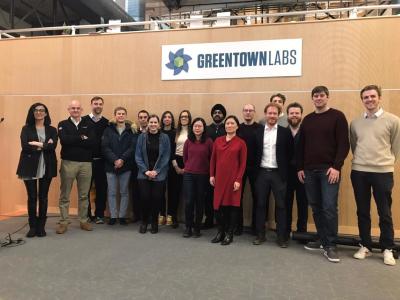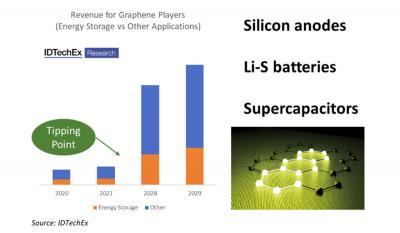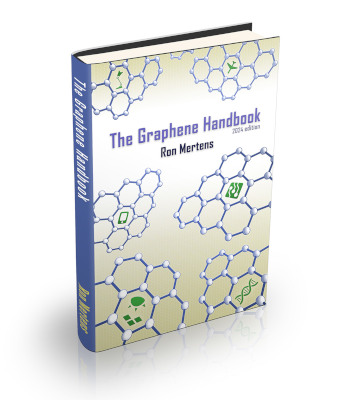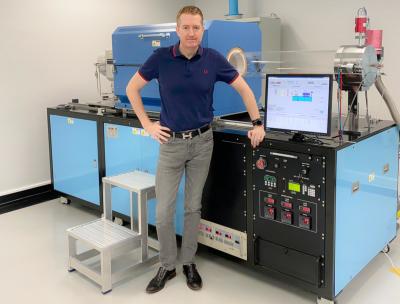The Graphene-Info newsletter, April 2020
Published: Wed, 04/01/20
How can graphene assist in the war on Coronavirus?
As researchers and companies all over the world set out to battle the Coronavirus pandemic, many are revisiting graphene as a material with potential for helping to win this fight. The reasons for such potential could be found in graphene's known antibacterial/antiviral properties, its beneficial traits for medical sensors and devices and more.
Huawei continues the use of graphene cooling films in its new P40 series
Huawei has launched its Huawei P40 flagship phone family, that includes three different devices: the Huawei P40, Huawei P40 Pro and, a new addition to the line-up for 2020, the Huawei P40 Pro Plus.
After many rumors about this line sporting a graphene battery - which were later disproved - it appears that Huawei's new P40 phones are using a graphene film cooling technology for heat management purposes (Huawei's SuperCool system), much like the Mate 20X and P30 line that preceded the P40.
MIT researchers use graphene and boron nitride to convert terahertz waves to usable energy
Researchers at MIT are working to develop a graphene-based device that may be able to convert ambient terahertz waves into a direct current. The MIT team explains that any device that sends out a Wi-Fi signal also emits terahertz waves —electromagnetic waves with a frequency somewhere between microwaves and infrared light. These high-frequency radiation waves, known as “T-rays,” are also produced by almost anything that registers a temperature, including our own bodies and the inanimate objects around us.
Terahertz waves are pervasive in our daily lives, and if harnessed, their concentrated power could potentially serve as an alternate energy source. Imagine, for instance, a cell phone add-on that passively soaks up ambient T-rays and uses their energy to charge your phone. However, to date, terahertz waves are wasted energy, as there has been no practical way to capture and convert them into any usable form. This is exactly what the MIT scientists set out to do.
The UK establishes a Graphene Innovation Group, explains how graphene assists business goals
Following a Global Business innovation Programme initiated in 2019, and a collaborative visit to the US, the UK established a new Graphene Innovation Group (UK-GIG) that puts together 15 specialists from UK companies that together share many years of experience in graphene and expertise across the entire value chain.
Scott Storey, a Business Innovation Advisor at Inventya and the lead coordinator at the UK-GIG, explains more about the group - click here to read the full story!
Significant Market Opportunities for Graphene in Energy Storage
A sponsored post by Dr. Alex Holland, IDTechEx
Graphene has been heralded as a wonder material for years, with many believing a tipping point is rapidly approaching. It undoubtedly has the potential for use in numerous applications with one of the most notable being the energy storage market. Li-ion demand for plug-in electric cars alone is forecast to be nearly 350 GWh by 2025. IDTechEx forecasts that over 30% of the graphene market will be used in energy storage applications within the next decade with multiple high-profile use cases
This article gives fascinating details on graphene’s potential in various energy storage applications, click here to read more.
The Graphene Handbook, 2020 edition
Graphene-Info is happy to announce the sixth edition of its very own Graphene Handbook, the most comprehensive resource on graphene technology, industry and market - now updated for 2020. Get your copy now to stay current on graphene research, development and market!
The graphene handbook has been read by leading materials engineers, business developers, researchers, equipment makers, private investors and others who wish to learn more about graphene today and in the future. We truly believe it is the best introduction to graphene!
The Graphene Handbook 2020 edition can be downloaded now for $97 USD (via Paypal or credit card). To secure your copy simply click here. Existing digital-copy customers are entitled to a 50% discount (and if you bought your copy in September 2019 or later, you'll get the upgrade for free). If you did not receive your upgrade coupon, contact us to get one.
The hardcopy printed version costs $149.99 and can be ordered through our publisher.
For more information, and to order your copy today, visit The Graphene Handbook info page.
planarTECH's crowdfunding campaign is already at 50%, reaches out to all investors to participate
A sponsored post by planarTECH. Remember, when investing your capital is at risk.
As planarTECH's business encompasses the entire graphene value chain (from academics to producers to application developers), the company would like to call out to all graphene professionals and others who may be interested to take part in this exciting graphene crowdfunding project.
planarTECH is aiming to raise at least £350,000, but even small investments (as little as £10) are welcome and encouraged since the company is set on making this a graphene community endeavor. Don't miss your chance to be a part of an early stage and promising graphene technology company! Read the full story and interview with PlanarTech’s CEO here.
Italian researchers from two Italian institutions have used graphene to develop a perovskite-silicon solar cell - a promising new solar technology - with an impressive conversion efficiency of 26.3%.
Researchers at NIST have used a graphene membrane to solve a long-standing problem affecting the understanding of both living cells and batteries.
Researchers from Swinburne University developed a graphene-based highly efficient solar absorbing film that absorbs sunlight with minimal heat loss.
Researchers from University College London have designed new graphene-based supercapacitor materials that enable higher power density than current designs.
A team led by Boston College researchers has used a sheet of graphene to track the electronic signals inherent in biological structures, in order to develop a platform to selectively identify deadly strains of bacteria.
NanoXplore recently announced that it has entered into an agreement with Echelon Wealth Partners to raise, on a bought deal private placement basis, approximately CAD$25,000,000 (around USD $17.6 million).
Researchers at Aalto University, collaborating with researchers at CNRS France, have developed a graphene-carbon nanotube catalyst which gives better control over important chemical reactions for producing green technology and clean energy.
With the emergence of the Covid-19 virus and its global threat, Graphenea initiated several steps to try and help those trying to combat this crisis - giving out free graphene to researchers and manufacturing disinfectant gel.
Researchers at the University of Illinois at Urbana-Champaign have found that crumpling graphene makes it more than ten thousand times more sensitive to DNA by creating electrical "hot spots".
A University of Sussex research team, led by Professor Alan Dalton, has received new funding of £1 million from private company Advanced Material Development, to pursue their research into graphene and other nanomaterials.
Advanced materials company Versarien announced that it had entered into a £6 million subscription agreement with US-based Lanstead Capital Investors.
Versarien Graphene (Hong Kong), a wholly-owned subsidiary of Versarien, recently signed a joint venture agreement with Young-Graphene (Beijing) Technology Company (YG).
Do you have a friend or a colleague that might be interested in Graphene technology? Forward this mail to update him on the world of Graphene.
If you received this email from a friend, subscribe to this newsletter here!








